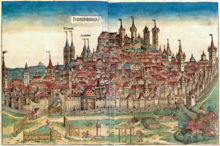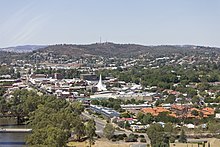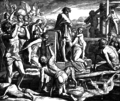The Cities Portal

A city is a human settlement of a notable size. The term "city" has different meanings around the world and in some places the settlement can be very small. Even where the term is limited to larger settlements, there is no universally agreed definition of the lower boundary for their size. In a more narrow sense, a city can be defined as a permanent and densely settled place with administratively defined boundaries whose members work primarily on non-agricultural tasks. Cities generally have extensive systems for housing, transportation, sanitation, utilities, land use, production of goods, and communication. Their density facilitates interaction between people, government organizations, and businesses, sometimes benefiting different parties in the process, such as improving the efficiency of goods and service distribution.
Historically, city dwellers have been a small proportion of humanity overall, but following two centuries of unprecedented and rapid urbanization, more than half of the world population now lives in cities, which has had profound consequences for global sustainability. Present-day cities usually form the core of larger metropolitan areas and urban areas—creating numerous commuters traveling toward city centres for employment, entertainment, and education. However, in a world of intensifying globalization, all cities are to varying degrees also connected globally beyond these regions. This increased influence means that cities also have significant influences on global issues, such as sustainable development, climate change, and global health. Because of these major influences on global issues, the international community has prioritized investment in sustainable cities through Sustainable Development Goal 11. Due to the efficiency of transportation and the smaller land consumption, dense cities hold the potential to have a smaller ecological footprint per inhabitant than more sparsely populated areas. Therefore, compact cities are often referred to as a crucial element in fighting climate change. However, this concentration can also have significant negative consequences, such as forming urban heat islands, concentrating pollution, and stressing water supplies and other resources. (Full article...)
Selected city -

Durban (/ˈdɜːrbən/ DUR-bən; Zulu: eThekwini, from itheku meaning "bay, lagoon") is the third-most populous city in South Africa, after Johannesburg and Cape Town, and the largest city in the province of KwaZulu-Natal. Situated on the east coast of South Africa, on the Natal Bay of the Indian Ocean, Durban is South Africa's busiest port and was formerly named Port Natal. North of the harbour and city centre lies the mouth of the Umgeni River; the flat city centre rises to the hills of the Berea on the west; and to the south, running along the coast, is the Bluff. Durban is the seat of the larger eThekwini Metropolitan Municipality, which spans an area of 2,556 km2 (987 sq mi) and had a population of 4.2 million in 2022, making the metropolitan population one of Africa's largest on the Indian Ocean. The city has a humid subtropical climate, with hot, wet summers and mild, dry winters.
Archaeological evidence from the Drakensberg mountains suggests that the area had been inhabited by hunter-gatherers millennia ago. Later, the Nguni people occupied the region. During Christmas 1497, Vasco da Gama saw the coast and named it Natal, the Portuguese word for Christmas. In 1824, English traders from Cape Colony, led by Francis Farewell and Henry Fynn, established a trading post at Port Natal, and later that year, Shaka, the Zulu king, granted them land around the Bay. In 1835, the settlement was named after Sir Benjamin D'Urban, then governor of Cape Colony. From 1860 onwards, indentured labourers from British India arrived in Durban, as well as later passenger Indians. Natal colony, which had grown, became a province of the Union of South Africa in 1910, and the town of Durban became, in 1935, a city. (Full article...)Did you know -
- ... that in the 1917 municipal election in Minsk, Belorussian parties only won 2 out of 102 seats?
- ... that New York City's Olympic Tower was meant to reflect St. Patrick's Cathedral but instead gave the city "the back of its hand"?
- ... that posters for John Lindsay's 1965 New York City mayoral campaign told voters that "John Lindsay Cares About You"?
- ... that New York City's Bartow–Pell Mansion became a museum after its operator was restricted from importing and exporting plants?
- ... that Ask la Cour, who came from Denmark, only planned to perform with the New York City Ballet for a few years, but spent two decades there and became a principal dancer?
- ... that during its planning stages, 53 West 53rd Street in New York City was shortened by 200 feet (61 m) to reduce the visibility of the mechanical rooms?
Related portals
Related WikiProjects
Wagga Wagga (/ˌwɒɡə ˈwɒɡə/; informally called Wagga) is a major regional city in the Riverina region of New South Wales, Australia. Straddling the Murrumbidgee River, with an urban population of more than 57,003 as of 2021, Wagga Wagga is the state's largest inland city, and is an important agricultural, military, and transport hub of Australia. The ninth largest inland city in Australia, Wagga Wagga is located midway between the two largest cities in Australia—Sydney and Melbourne—and is the major regional centre for the Riverina and South West Slopes regions.
The central business district is focused around the commercial and recreational grid bounded by Best and Tarcutta Streets and the Murrumbidgee River and the Sturt Highway. The main shopping street of Wagga is Baylis Street which becomes Fitzmaurice Street at the northern end. Wagga is accessible from Sydney via the Sturt and Hume Highways, Adelaide via the Sturt Highway and Albury and Melbourne via the Olympic Highway and Hume Highway. Wagga is in an alluvial valley and much of the city has a problem with urban salinity. (Full article...)Selected article -

General images -
Topics
List articles
Subcategories
Associated Wikimedia
The following Wikimedia Foundation sister projects provide more on this subject:
-
 Commons
Commons
Free media repository -
 Wikibooks
Wikibooks
Free textbooks and manuals -
 Wikidata
Wikidata
Free knowledge base -
 Wikinews
Wikinews
Free-content news -
 Wikiquote
Wikiquote
Collection of quotations -
 Wikisource
Wikisource
Free-content library -
 Wikiversity
Wikiversity
Free learning tools -
 Wiktionary
Wiktionary
Dictionary and thesaurus
-

-

-

-

-
Random portal
Purge server cache





























